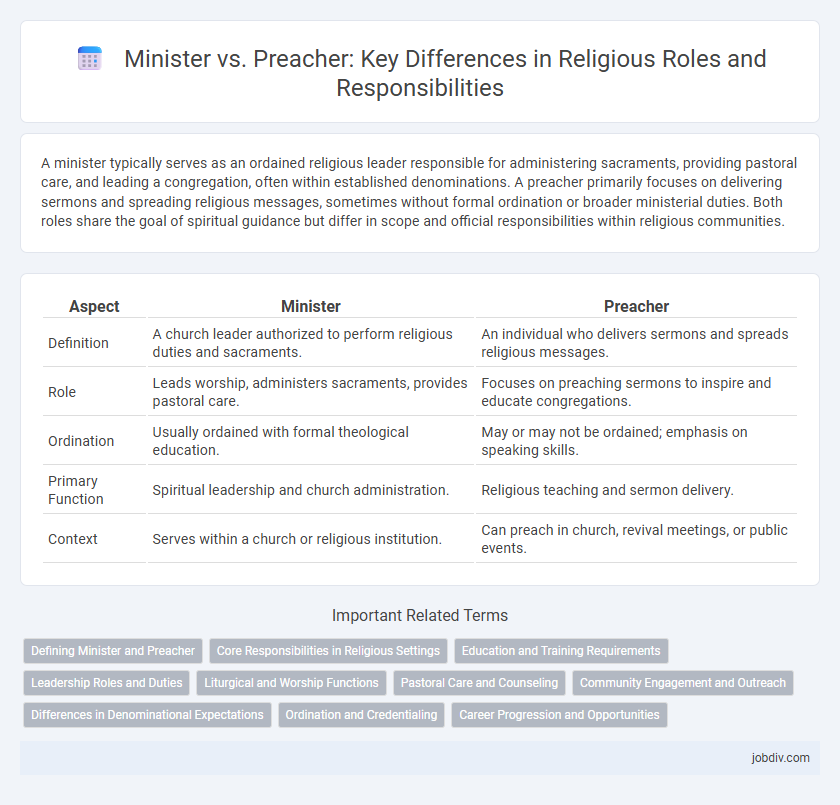A minister typically serves as an ordained religious leader responsible for administering sacraments, providing pastoral care, and leading a congregation, often within established denominations. A preacher primarily focuses on delivering sermons and spreading religious messages, sometimes without formal ordination or broader ministerial duties. Both roles share the goal of spiritual guidance but differ in scope and official responsibilities within religious communities.
Table of Comparison
| Aspect | Minister | Preacher |
|---|---|---|
| Definition | A church leader authorized to perform religious duties and sacraments. | An individual who delivers sermons and spreads religious messages. |
| Role | Leads worship, administers sacraments, provides pastoral care. | Focuses on preaching sermons to inspire and educate congregations. |
| Ordination | Usually ordained with formal theological education. | May or may not be ordained; emphasis on speaking skills. |
| Primary Function | Spiritual leadership and church administration. | Religious teaching and sermon delivery. |
| Context | Serves within a church or religious institution. | Can preach in church, revival meetings, or public events. |
Defining Minister and Preacher
A minister is a religious leader authorized to perform ceremonies, provide spiritual guidance, and oversee the administration of a congregation, often ordained within a particular denomination. A preacher primarily focuses on delivering sermons and spreading religious teachings, emphasizing public proclamation of faith. While both roles involve spiritual leadership, ministers typically hold broader pastoral responsibilities beyond preaching.
Core Responsibilities in Religious Settings
Ministers oversee the spiritual guidance and pastoral care of a congregation, often administering sacraments, leading worship services, and providing counseling. Preachers primarily focus on delivering sermons and interpreting religious texts to inspire and educate the community. Both roles play crucial parts in religious settings, with ministers typically bearing broader pastoral responsibilities beyond preaching.
Education and Training Requirements
Ministers typically undergo formal theological education, often earning degrees such as a Master of Divinity from accredited seminaries, which provides comprehensive training in scripture, pastoral care, and church administration. Preachers may have less formal training, relying more on practical experience, local church mentorship, or shorter certificate programs focused on preaching skills and biblical interpretation. The educational background of ministers usually equips them for broader leadership roles within religious organizations, while preachers primarily focus on delivering sermons and spiritual guidance.
Leadership Roles and Duties
Ministers typically hold formal leadership roles within religious organizations, responsible for overseeing congregational activities, administering sacraments, and providing spiritual guidance. Preachers primarily focus on delivering sermons and interpreting scripture to inspire and educate the congregation. Both roles emphasize spiritual leadership, but ministers often carry broader administrative duties beyond preaching.
Liturgical and Worship Functions
Ministers typically oversee liturgical functions by administering sacraments, leading formal worship services, and ensuring adherence to doctrinal practices. Preachers primarily focus on delivering sermons that interpret scripture and inspire the congregation during worship. While ministers may conduct a broader range of ceremonial duties, preachers emphasize the proclamation of religious messages within the worship context.
Pastoral Care and Counseling
Ministers typically provide comprehensive pastoral care and counseling, addressing the spiritual, emotional, and practical needs of their congregation through ongoing support and guidance. Preachers focus primarily on delivering sermons and teaching biblical principles, with less emphasis on individualized counseling or long-term pastoral care. Effective pastoral care involves both compassionate listening and offering scriptural wisdom tailored to personal challenges within the faith community.
Community Engagement and Outreach
Ministers often engage deeply with community outreach by providing counseling, organizing social services, and fostering long-term relationships within their congregation. Preachers primarily focus on delivering sermons and spiritual messages that inspire collective worship and moral reflection. Both roles contribute uniquely to strengthening community bonds through faith-based initiatives and support programs.
Differences in Denominational Expectations
Ministers often serve broader leadership roles within denominations, including sacraments administration and pastoral care, while preachers primarily focus on delivering sermons and biblical teachings. Denominational expectations for ministers typically involve formal ordination and ongoing ecclesiastical responsibilities, whereas preachers may be laypersons or itinerant speakers depending on the tradition. These distinctions highlight varying theological emphases and governance structures across Christian denominations.
Ordination and Credentialing
Ordination is a formal process that grants ministers official recognition and authority within religious organizations, often involving a rigorous examination of doctrine and personal qualifications. Preachers may deliver sermons without formal ordination, but ministers typically hold credentials that validate their role in administering sacraments and leading congregations. Credentialing varies among denominations, with some requiring extensive theological education and others offering ordination based on experience and community endorsement.
Career Progression and Opportunities
Ministers often pursue formal theological education and ordination, opening pathways to roles such as pastoral leadership, counseling, and denominational administration, which provide structured career advancement. Preachers primarily focus on delivering sermons and may gain recognition through public speaking opportunities and evangelism, with career growth linked to congregational influence and media presence. Both roles offer distinct opportunities, but ministers typically experience broader career progression within established religious institutions.
Minister vs Preacher Infographic

 jobdiv.com
jobdiv.com